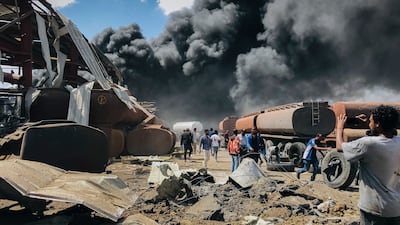Ten people were killed in a second day of air strikes on the Tigray region of Ethiopia on Wednesday, a hospital official said.
Twin drone attacks hit a residential neighbourhood in the regional capital of Mekelle, said Kibrom Gebreselassie, a senior official at Ayder Referral Hospital, the biggest in Tigray.
The attack was the second such bombing in two days.
“Death toll raised to 10,” Mr Gebreselassie told AFP.
Fasika Amdeslasie, a surgeon at the hospital, said the first bombing injured two women. It was followed by a second “drone strike on the people gathered to help and see the victims”.
“Among the victims, a father was dead and his son is taken to surgery”, he wrote on Twitter.
The strike came shortly after rebels said they were willing to observe an immediate ceasefire and participate in a peace process led by the African Union after about two years of war.
Tigray People's Liberation Front spokesman Getachew Reda said on Twitter that the attack killed and wounded “innocent civilians”.
Access to northern Ethiopia is severely restricted and Tigray has been under a communications blackout for more than a year.
The reported attack came after a drone strike on Mekelle University on Tuesday, which left people wounded and caused property damage, according to the TPLF.
Prime Minister Abiy Ahmed's government has not commented on this week's incidents.
Tigray has been hit by several air strikes since fighting resumed in late August between government forces and their allies and TPLF rebels in northern Ethiopia.
The return to combat shattered a March truce and dashed hopes of peacefully resolving the war, which has triggered a humanitarian crisis in northern Ethiopia.
Both sides have accused the other of firing first. Fighting has spread from southern Tigray to other fronts farther north and west, while drawing in Eritrean troops who backed Ethiopian forces in the early phase of the war.
On Sunday, the TPLF said it was ready for a ceasefire and would accept a peace process led by the African Union, removing an obstacle to negotiations with Mr Abiy's government.
The international community has urged the warring sides to seize the moment for peace.
Addis Ababa has yet to officially comment on the overture by Tigrayan authorities, which dominated national politics for about three decades until Mr Abiy came to power in 2018.
Mr Abiy's government has declared the TPLF a terrorist group, and considers its claim to authority in Tigray illegitimate.
Untold numbers of civilians have been killed since war broke out in Africa's second most populous country, and grave rights offences by all sides against civilians have been documented.
Mr Abiy, a Nobel Peace Prize laureate, sent troops into Tigray in November 2020 to topple the TPLF in response to what he said were attacks on federal army camps.

